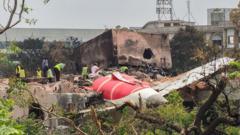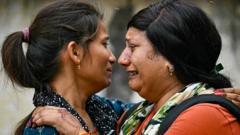The pardon of Moussa Dadis Camara, linked to one of Guinea's most infamous massacres, raises questions amid plans for victim compensation.
Guinea's Former Ruler Granted Pardon After Convictions for Stadium Massacre

Guinea's Former Ruler Granted Pardon After Convictions for Stadium Massacre
Moussa Dadis Camara, the ex-military leader of Guinea, receives a pardon from the ruling junta just months into his 20-year sentence for crimes against humanity.
Guinea's ruling junta has made headlines by pardoning former military leader Moussa Dadis Camara, who had been serving a 20-year sentence for crimes against humanity stemming from the notorious 2009 stadium massacre. An official decree broadcasted on state television cited health concerns as the reason for the pardon. The massacre, which occurred during a rally advocating for civilian governance, resulted in the deaths of over 150 individuals and numerous rapes, marking it as one of the darkest chapters in Guinea's history.
Camara, who initially seized power as an army captain following the death of President Lansana Conté in 2008, fled the country after an assassination attempt but returned in 2022 to face justice. He maintained his innocence throughout the legal proceedings. A 22-month trial concluded in July 2024 with Camara alongside seven military commanders found guilty and handed lengthy sentences for their roles in the tragedy.
This recent pardon comes coincidentally with government announcements aimed at compensating victims of the massacre. According to reports from Justice Info, compensation estimates include $173,000 per rape victim, $115,500 for each death or case of disappearance, $57,000 for instances of looting, and $23,000 per case of torture.
On the day of the massacre in September 2009, thousands of protestors assembled at a Conakry stadium demanding that Camara refrain from running for president. Tragically, many participants were met with violent repression, resulting in shootings, stabbings, beatings, and a chaotic stampede. Among those affected were over 100 women and girls who were reported to have been raped during the ensuing turmoil.
While details regarding Camara's alleged health issues remain undisclosed, his brother has expressed gratitude towards the current president following the pardon. Camara's history has continued to influence Guinea's political landscape; after his departure, his deputy oversaw the transition to a civilian government that lasted a decade until a coup in September 2021, which led to more political upheaval in the nation. The current situation continues to evolve as the country grapples with its military legacy and justice for victims of past atrocities.
Camara, who initially seized power as an army captain following the death of President Lansana Conté in 2008, fled the country after an assassination attempt but returned in 2022 to face justice. He maintained his innocence throughout the legal proceedings. A 22-month trial concluded in July 2024 with Camara alongside seven military commanders found guilty and handed lengthy sentences for their roles in the tragedy.
This recent pardon comes coincidentally with government announcements aimed at compensating victims of the massacre. According to reports from Justice Info, compensation estimates include $173,000 per rape victim, $115,500 for each death or case of disappearance, $57,000 for instances of looting, and $23,000 per case of torture.
On the day of the massacre in September 2009, thousands of protestors assembled at a Conakry stadium demanding that Camara refrain from running for president. Tragically, many participants were met with violent repression, resulting in shootings, stabbings, beatings, and a chaotic stampede. Among those affected were over 100 women and girls who were reported to have been raped during the ensuing turmoil.
While details regarding Camara's alleged health issues remain undisclosed, his brother has expressed gratitude towards the current president following the pardon. Camara's history has continued to influence Guinea's political landscape; after his departure, his deputy oversaw the transition to a civilian government that lasted a decade until a coup in September 2021, which led to more political upheaval in the nation. The current situation continues to evolve as the country grapples with its military legacy and justice for victims of past atrocities.





















